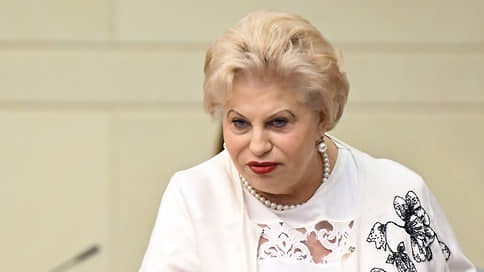The Ombudsman is invited to check the article of the Criminal Code on discrediting the military
[ad_1]

A group of lawyers and municipal deputies asks the capital’s Ombudsman Tatyana Potyaeva to seek a review of the new Art. 207.3 of the Criminal Code on “military fakes”. In theory, such a request can be sent to the Constitutional Court by any district court considering the case of “dissemination of deliberately false information about the actions of the army.” However, the metropolitan courts have consistently denied petitions to test the new law. If the ombudsman pays attention to the problem, the case will move, the authors of the appeal believe. Ms. Potyaeva told Kommersant that she had not received the letter yet, but was ready, together with the deputies of the Moscow City Duma, to begin work on analyzing the application of the article.
A letter to the Moscow Ombudsman (a copy is available to Kommersant) was signed by 35 people: 12 lawyers, 21 municipal deputies, one lawyer-mundep and one lawyer-deputy of the Moscow City Duma. They express “serious concern” about the application of the new Art. 207.3 of the Criminal Code of the Russian Federation (“Public dissemination of knowingly false information about the use of the armed forces of the Russian Federation”). “We observe with regret that this article is actively used to persecute our colleagues – municipal deputies and lawyers, in particular Alexei Gorinov, Dmitry Talantov, Ilya Yashin (included in the register of foreign agents.— “b”) and others,” the letter says. “The nature of the charges, the severity of the penalties, and the extent of the application of this article are cause for serious concern.”
Recall that in March, State Duma deputies added new articles to the Criminal Code and the Code of Administrative Offenses “to protect the army from information attacks.” Lawyers and human rights activists criticized the innovations as violating the constitutional rights to freedom of opinion and speech. More than two dozen criminal cases have been initiated in the capital under the article on “public dissemination of knowingly false information” about the army, the authors of the letter point out. In addition, the Agora human rights group recorded more than 100 such cases throughout the country. Among the defendants are politicians, journalists, lawyers and lawyers (for example, the head of the Bar Association of Udmurtia, Dmitry Talantov, and the defender of journalist Ivan Safronov, were arrested). The most resonant case was the case of the Moscow municipal deputy Alexei Gorinov, who was sentenced to seven years in prison for publicly criticizing the actions of the Russian army on the territory of Ukraine: the deputy, in particular, spoke about the inappropriateness of holding a municipal children’s drawing competition against such a background.
“The provisions of Article 207.3 of the Criminal Code of the Russian Federation are formulated in an extremely vague manner, which can lead to their broad interpretation and to decisive arbitrariness in their application,” the letter says. “There are serious grounds to believe that this article contradicts the Russian Constitution. Obviously, the Basic Law of the country does not provide for the possibility of criminal punishment for public expression of opinion and pacifist statements.
The authors of the appeal say that the defense of Aleksey Gorinov pointed out to the court the unconstitutionality of norm 207.3 of the Criminal Code and asked to apply to the Constitutional Court for clarification on this matter. However, the petition was rejected: the court replied that Mr. Gorinov himself could apply to the Constitutional Court. “But citizens can apply to the Constitutional Court only after going through all the available instances of legal proceedings up to the Supreme Court, and in practice this takes months and years. All this time, people can be in a pre-trial detention center or already serve a sentence, the authors of the appeal remind. The judicial system in Moscow knows cases when courts of general jurisdiction did not send requests to the Constitutional Court, a person was serving a sentence, and subsequently the applied norms were recognized as unconstitutional. We consider such an unjustified deprivation of a person’s freedom to be too high a price and an unacceptable omission by the district courts of Moscow and the Moscow City Court.”
Municipal deputies and lawyers ask Ms. Potyaeva “to send to the Moscow City Court an analysis of Art. 207.3 of the Criminal Code and the current practice of its application in Moscow, including the problem of refusal by Moscow courts of a request to the Constitutional Court.” They point to another important circumstance – the impossibility of predicting which article the investigation will choose for the same actions: Art. 207.3 of the Criminal Code of the Russian Federation or Art. 20.3.3 of the Code of Administrative Offenses (“Public actions aimed at discrediting the use of the RF Armed Forces”).
The authors state that they sent the letter to Tatiana Potyaeva’s official mail on Wednesday. The ombudsman told Kommersant that she had not yet seen him: “I know about this article of the Criminal Code, but I have not yet analyzed the practice, because no one has contacted me on this topic yet. As soon as I see the letter, I think we will start working together with the deputies.”
[ad_2]
Source link








